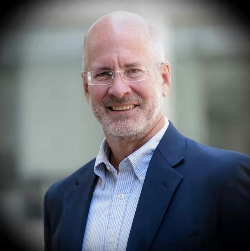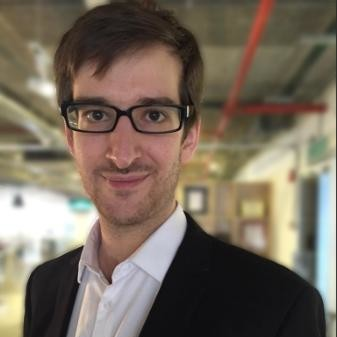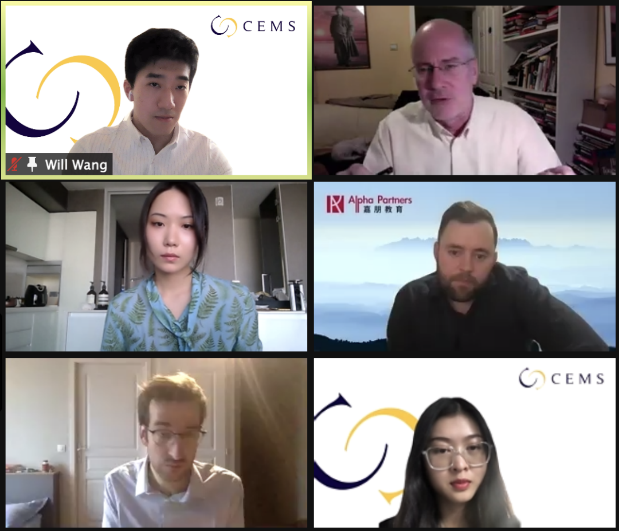To celebrate the 2021 Global Alumni Week, Tsinghua University's CEMS Club Beijing and University of Sydney's CEMS Club Sydney on March 7th, 2021, 15:00-16:30 Beijing Standard Time, join together to host the Innovation and Entrepreneurial Environment in Asia Pacific Round Table Seminar. 40 CEMSies from 8 CEMS schools participated in this event. We are honored to have invited Professor Steven White of Tsinghua University SEM to host the round table and three entrepreneurs from the Asia-Pacific region: Tsinghua University MiM program class 2011 alumnus Stewart Johnson, Tsinghua University MiM program class 2019 student Uradee Kunkiratiyut (Meng Lu)and University of Sydney MiM program class 2013 alumnus Fabien Martin to share their incredible entrepreneurial stories and insights.

01 Host&Entreprenuers

Steven White
Dr. Steven White is Associate Professor in the Department of Innovation, Entrepreneurship and Strategy of Tsinghua University’s School of Economics and Management, where he focuses on issues related to creativity and innovation, entrepreneurship and internationalization. He has served as founding Associate Academic Director of Tsinghua University’s x-lab, a resource platform and ecosystem hub that brings together students, alumni, faculties and executives to develop the entrepreneurial capabilities in teams as they develop new ventures. He is also an angel investor and provides strategic advice to new ventures. His current research projects investigate the role of entrepreneurship in the emergence of new industries, competition between ecosystems, China’s national innovation and entrepreneurial ecosystem, and the management of cooperation in alliances; he has been recognized as one of the top 20 China-based management scholars. Before joining Tsinghua, Dr. White taught at INSEAD and the Chinese University of Hong Kong. He received his Ph.D. from MIT’s Sloan School of Management, MA from the International University of Japan, and BS from Duke University.

Stewart Johnson
Stewart Johnson studied in TSEM MiM program in 2011. Stewart is a British entrepreneur and co-founder of two Chinese companies in secondary education and restaurant incubation. After winning the prestigious Chinese Bridge (汉语桥) competition in front of 300 million people on Chinese TV in 2010, Stewart traded in a London legal career for a full scholarship at Tsinghua University, where he met his Chinese co-founders.
In his second year, he set up Alpha partners education, which is a company that he is still working on to this day. In 2015, he set up Beijing's first culinary incubator. He raised around U.S.$500,000 in venture funding, grew quite quickly but then also failed quite dramatically.

Fabien Martin
Fabien Martin studied as a CEMS student in University of Sydney in 2013 and a CEMS exchange student in TSEM & SGH in 2015. Fabien has been working in Chengdu, China, in the technology sector for the past 5 years. He has worked on developing and deploying Web, Computer Vision & Natural Language Processing applications both in China and abroad. He is currently co-founder and head of AI of Founders Lair and co-founder of and venture builder at Gradients.tech. He was previously working as a VC analyst for Catcha Group, one of the most successful venture builder in South East Asia, with exits such as iFlix and iProperty.
Founders Lair, or FLair, is a free peer to peer platform for founders & startup enthusiasts, which strives to help entrepreneurs find faster the resources they need. His team is based in Beijing, Algiers, Rome, Paris, Oslo, Kharkiv, Ahmedabad and Lagos.

Uradee Kunkiratiyut
Uradee Kunkiratiyut is currently a TSEM MiM student (2019). She runs Lunique Real Estate Co.,Ltd. in Pattaya, Thailand. Lunique Real Estate and Banyan Tree Group (through its wholly-owned subsidiary Banyan Tree Hotels & Resorts) have signed a joint agreement for the development of a new project - Skypark LuceanJomtien Pattaya. The first phase comprises 2 buildings of 60-storey and 31-storey respectively with premium facilities. It features 899 units with total investment value of over 4,500 Million THB . They plan to start construction in 2022 and finish in 2025.
02 Round Table

Q1: Looking back to your time at the CEMS program, what has impacted you the most and helped you?
Uradee Kunkiratiyut:
As a current second-year student of the program, I’ve benefited a lot. The knowledge I learned from classes can be applied to my real-world business situations. Talent Assessment class helped me to improve my current recruiting process, and other classes like Project Management and Marketing also impacts my daily decision making. Being in the MiM program allows me to meet different professionals in the industry, and taught me to speak out my opinion bravely.
Stewart Johnson:
Broadly speaking, the supportive network that CEMS and Tsinghua provided, helped me with my business development; Classmates and professors opened doors for my networking and introduced both schools and inventors to me. Even many of my future recuritments were helped by my network at Tsinghua. To me, being an entrepreneur is about tapping into the different social network and meeting different people to see what others could bring to the table, and this program provided the opportunty for me to meet people from various backgrounds.
Fabien Martin:
The capacity to adapt, is what CEMS gave me, through my exchange experience I had the opportunity to immerse myself in the different cultures and talk with the local people, which made me feel comfortable about going to different places and allowed me to integrate into the local life quickly.
However, the downside of CEMS is that students in CEMS are super awesome, you are always surrounded by many talented and motivated students, but once you graduate, you realize that you need to adjust your mentality and expectation of others.
Q2: Instead of going into corporations, what made you choose this difficult path of starting a business and being an entrepreneur?How did you decide which industry you wanted to go into?
Uradee Kunkiratiyut:
For me it wasn't much of a choice, It’s a family business, I don’t think real estate is really friendly to female, but since this is family business and I don’t want to disappoint my father, so I took up the responsibility.
Stewart Johnson:
For me, I always knew that I want to be my own boss and do my own thing, but the challenges were what to do and in what industries. I knew I wanted to start my business in China, so I came to Tsinghua. After attending many events and meeting many people, I pulled together all the resources I have, evaluated the potential of industries and decided to go into the education sector. For my restaurant incubation business it came to me from my personal experiences, being British I found it difficult to find a good western foreign restaurant, the idea just popped up.
Overall, for me starting a business is to think through my personal experiences, determine what i can bring to the table and how I can combine it with someone else's.
Fabien Martin:
My first business started because I wanted to stay in South East Asia and I have accumulated really good relationships working in Venture Capital. This background helped me to start my first business, which is an accessible data platform for companies.
Q3: What lessons did you learn from your entrepreneur experience?
Fabien Martin:
There are couples lessons I’ve leaned during my startup:
① Choose your co-founders wisely, pick those people who share the same values with you.
② Get something out there! Release the product ASAP, and get initial feedback from your costumers, don't wait for a perfect product.
Uradee Kunkiratiyut:
Keep studying, what you’ve learned can actually apply to business world. After learning Talent Assessment class last semester, I introduce Big Five Assessment for company’s recruitment process, which improve the efficiency of recruitment.
Stewart Johnson:
① When your competitior go low then you go high. Don't drag yourself too much into competition, focus on what you are doing;
To address more on what Fabien said, which resonate me a lot:
② Choose co-founders or people who you work with wisely. If you can't see yourself working with them for your whole life, don't work with them for a day.
③ Launch the product quickly and then change it to fit market demand. I spent months developing our APP and I was obsessed on what’s useful for users but is that really what users needed? Foucing on what you consumer needs instead what you think they want.
④ The idea is worth nothing, the execution is the key point.

03 Q&A
Q1: We have very different backgrounds and are in different industries. What do you see as being interesting to look into for the future?
Stewart Johnson:
I think remote workforce and education are very interesting. My business model is B2B not B2C and my clients are school not individual customers. Schools, universities are dinosaurs. They don't move very fast, but if you can build solutions for schools that can be quickly adopted, then that's gonna be very interesting. Otherwise they'll lose all their enrollment. Students are going to start just getting Micro credits everywhere and then packaging that for university. And they're going to just bypass the traditional education system. There's a massive vested interest in that not happening. I think that's a multi-billion dollar opportunity, and one which I'll have a crack at, over the next 10 years.
Fabien Martin:
I think Chinese are very entrepreneurial and they like adapting new technology to everything. In European countries, there is a huge opportunity to adapt many of these new technologies. There is a huge premium in closing the gap between these different cultures to make it one unique market, there can be a lot of opportunities for an entrepreneur that can solve these cultural problems.
Uradee Kunkiratiyut:
I really love food, so I'm very interested in the food industry. After Covid, people are going to be more focused on health, I think healthy food is the future of the food industry. I also have a protein shake brand in China. During the pandemic, people are more focused on their body shape and health. That's what I would like to do in the future.
Q2: What advice can you give to others, how should they make the decision? Should they jump in and become entrepreneurs? Or should they wait for the right opportunity? Or should they just go to a large firm and make a lot of money?
Uradee Kunkiratiyut:
I think if you want to do business, you need to determine whether you want to earn fast money or if you want to make great products. Great products always have more value.
Stewart Johnson:
If you really want to be an entrepreneur, you need to have both a good group of people and a good idea. Otherwise, I would tend to recommend that you just work for someone else, because they will be the one paying your salary and you can still learn a lot from their mistakes. Basically, they are paying for their mistakes and you are getting all the knowledge.

The event was a great success! We want to express our sincere appreciation for our three guest speakers for sharing their experiences generously and special thanks to professor White for hosting, as well as to the 40 CEMSies that participated with vigor. We also want to thank CEMS Club Sydney for cooperating with us for this event, without whom the success of this event couldn't have been possible! Lastly, we would like to thank everyone for joining us, we hope you took something away from this event, and if you have any questions and comments, please contact us at Tsinghua University CEMS Club Bejing.

